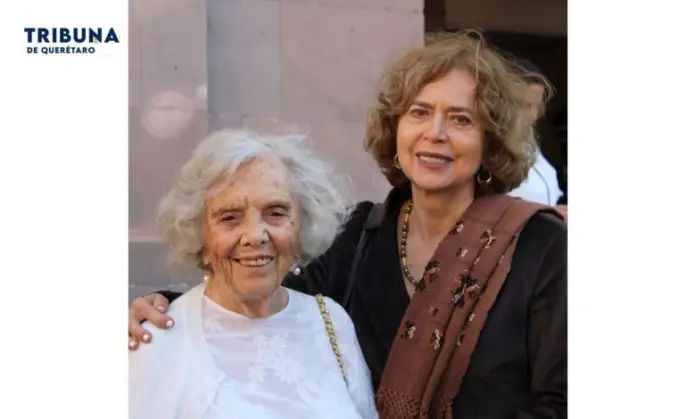With a discreet demeanor and a sure step, the writer Elena Poniatowska entered the Teatro de la República to accompany the first ceremony of February 5 of President Claudia Sheinbaum, who focused her speech on the historical legacy of struggle that resulted in the Constitution of 1917 and the defense of sovereignty in the face of the belligerent international panorama.
The return of Donald Trump to the White House has marked the international agenda and for Mexico the prospect of the imposition of tariffs, the deportation of compatriots, the intervention in internal affairs under the excuse of security, as well as an emboldened racist and xenophobic rhetoric has become inevitable.
For Poniatowska, the recent demonstrations of the president of business origin are mainly bravado, without all the necessary support to support it, “I think Trump barks, but in the end he just keeps barking. I hope he never bites. It would not be good for him to bite because he would lose all his teeth.”
The author of “La noche de Tlatelolco” attributed a fundamental role to Sheinbaum in keeping the president of the United States at bay, whose qualities and firmness as a leader would have given rise to an unusual relationship for the occupant of the Oval Office.
“Everything is new because she is the first female president of our country. She is a university student, she is an intellectual, she is a thinking woman and she is a woman who also knows how to command, she knows how to lead the country. And that, compared to Trump, must surprise him a lot” said the award-winning writer.
The UAQ in her memory
Elena Poniatowska recalled when the Autonomous University of Querétaro recognized her with the international award “Hugo Gutiérrez Vega for the Arts and Humanities”, in its third edition in 2012, held in the same venue. At one point, she recalled the treasured memory of José Emilio Pacheco and Carlos Monsiváis:
“I have always been very close to Querétaro, for years now since I came here, and the University of Querétaro, with José Emilio Pacheco and Carlos Monsiváis, gave me an Honoris Causa doctorate that I treasure, because they are both in heaven and I am still here.”
On that occasion, Elenita was accompanied by the rector Gilberto Herrera and the man who gives the award its name, Hugo Gutiérrez Vega, at an award ceremony in which the writer recalled her history with the entity, which began with her mother, María de los Dolores Amor, who frequently visited the crystalline springs that existed in Tequisquiapan.
La Poni described Querétaro as a “refuge that protects us from absences, defeats and disappointments […] it was its most beautiful, noblest, and most intelligent state in the entire Mexican Republic.”
The political sensitivity of the Red Princess also came to light on that occasion, when she did not let go unnoticed her condemnation of the acts of repression surrounding the inauguration of Enrique Peña Nieto as President of the Republic, when, above all, she placed her faith in the youth and expressed her desire to avoid further polarization.
In civil resistance and common struggles
In late 2006, Elena Poniatowska accompanied an act of civil resistance in Querétaro in front of the Palacio de la Corregidora, starring a hunger strike, in response to the call of the Union of Indigenous and Peasant Women against the irregularities in the election of the municipal president of Amealco, in which a comfortable margin of victory favored the PRI member Javier Cajiga over the then PRD member Oscar Pérez, who was proclaimed “alternate mayor.”
In an episode parallel to the process that took place during the 2006 federal election, in which she supported Andrés Manuel López Obrador from Tabasco, in which suspicions of fraud to give the victory to the PAN candidate Felipe Calderón and the smear campaign against the former head of the capital’s government led to a resistance movement among her supporters, in which intellectuals and ordinary citizens alike came together to occupy the public space, and in which Poniatowska herself joined the demand for a review “vote by vote, polling station by polling station.”
During her brief stay in Querétaro at that time, Poniatowska spoke of the need to build a “peaceful civil resistance movement,” to value the social contributions of women both historical and current, as well as warning of the risks of repression by the Mexican State.
But Elenita’s closing words focused on herself and her will to live. When asked how she would like to be remembered, she mentioned that “she would not like to be remembered, because I do not want to die yet,” in which she alluded to seeking to be fulfilled with herself and wanting others to “have the feeling that they can count on” her.

Source: tribunadequeretaro




